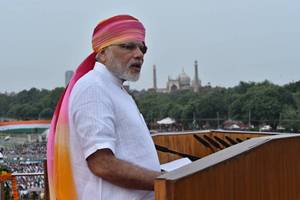On India’s 70th Independence Day, PM Narendra Modi once again took the stage in a turban, without a bullet-proof enclosure – despite the increasing threat perception. Of course, the PM wanted to send a message with no barriers around him, however, his speech seemed uncharacteristically defensive this time on the domestic front, unlike in the past when his speeches focused on a bigger vision. His detailed recounting of NDA government’s schemes was a bid, perhaps, at tackling the inevitable mid-term fatigue that sets in for every government – even one where the leader is personally very popular and has won an absolute majority on his own.
He turned on the aggression with a reference to Balochistan, Gilgit in this speech, driving home a very hard message to Pakistan. His reference to Balochistan and PoK indicated a huge shift in policy towards Pakistan and is perhaps the biggest takeaway from his speech. For the PM to make a reference to this from the Independence Day speech from the Red Fort was unusual, but, was an aggressive counter to Pakistan’s reference to Kashmir a day earlier as a part of its Independence Day celebrations.
Of course, it can be argued that his government couldn’t say much in earlier speeches about domestic policies & schemes as it needed time to implement and deliver. In that sense, it is only natural that a PM would recount the achievements of his government after more than two years.
[related-post]
Many would allege that Punjab weighed on the PM’s mind in the Independence Day speech, with his reference to Guru Gobind Singh. A first perhaps for PM Modi, who has avoided electoral considerations in his previous two speeches on Independence Day. His special mentions focused on farmers, inflation, women seemed to be out of the older template, where PMs sought to reach out to the electorally important sections of society.
PM Modi started off by saying that he won’t recount the achievements of his government. I would, he said, instead focus on the work culture of my government, its ‘niyat’. But, he went on recount his government’s achievements – right from the Aadhaar to LED bulbs to fertiliser for farmers, passports and so on.
He also seemed to be countering the criticism that his government is persisting with wasteful schemes of previous governments. Governments are about continuity, he said, I am personally ensuring that schemes announced by many previous governments continue, he said, perhaps hinting perhaps at the continuation of MNREGA, the scheme that attracted much flak from him and his party in the run-up to the elections and even thereafter. At the same time, he emphasised that it is easy for him to start new schemes, but, he wants to stay away from populism.
The common thread was the focus on delivery of his government’s schemes. His opponents have accused him of making big announcements but not doing enough on the ground. The prime minister used the occasion to tell India how his government’s policy actions have translated into visible benefits for them on the ground.
This wasn’t a Narendra Modi speech we are used to – of a PM laying down a grand vision for change. It was a speech of a PM, who explained how his promises of the past are being translated into reality. However, this is by no means indicative of Modi losing his charm or his will to bring radical change. India’s drastic and aggressive shift on Pakistan vis a vis Balochistan & PoK shows the PM is more than wiling & able to take the big decisions when they matter.


